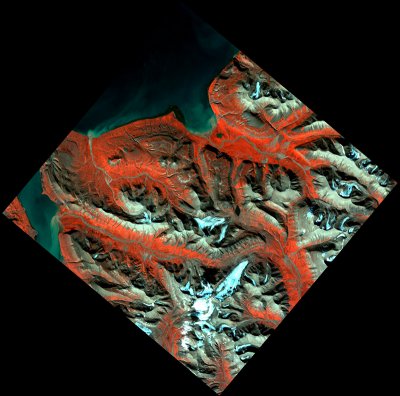In autumn 2021 SIOS held a training course on how to effectively use hyperspectral remote sensing data acquired from satellites, from airborne campaigns and from the ground, and their associated tools and software in the context of research in Svalbard. The course was intended for scientists, master/Ph.D. students and technicians with little or no experience with hyperspectral remote sensing techniques. The training was delivered by remote sensing experts from SIOS member institutions, international researchers, and experts from industry. The goal of the course was to teach participants the basic skills needed to acquire, analyse, and visualize hyperspectral data sets derived from aircraft and satellites.
- Time: 6 - 10 September 2021
- Location: Online
- Recordings: Available
COURSE PROGRAMME AND RECORDINGS
- 6 September 2021
-
Introduction to hyperspectral remote sensing - Video
Trond Løke (Norsk Elektro Optikk) and Agnar Sivertsen (NORCE)Key quality parameters in hyperspectral remote sensing - Video
Trond Løke (Norsk Elektro Optikk) and Agnar Sivertsen (NORCE)Virtual field excursion: Acquisition of airborne HS data from Dornier aircraft (hands-on)
Trond Løke (Norsk Elektro Optikk) and Agnar Sivertsen (NORCE) - 7 September 2021
-
Basic processing of hyperspectral data - Video
Trond Løke (Norsk Elektro Optikk) and Agnar Sivertsen (NORCE)ENVI: Application specific algorithms (hands-on)
Practice session and mini-projects based on Dornier data (hands-on)
Mentors: Trond Løke, Agnar Sivertsen, Shridhar Jawak - 8 September 2021
-
PRISMA mission: capabilities of hyperspectral observations - Video
Luigi Ansalone ( Italian Space Agency)Copernicus Hyperspectral Imaging Mission (CHIME) - Video
Andrea Taramelli (IUSS University)Generation of biophysical variables using PRISMA Hyperspectral data (hands-on)
Emiliana Valentini (CNR)Practice session and mini-projects based on PRISMA data
Mentors: Emiliana Valentini, Shridhar Jawak - 9 September 2021
-
Vegetation spectroscopy (theory) - Video
Juan Quiros (Forschungszentrum Jülich)Upscaling/(Downscaling) of FLoX-measurements to UAV-/aircraft-/spaceborne sensors - Video
Juan Quiros (Forschungszentrum Jülich)The spatial relation between airborne-SIF maps and the water available for plants in the root zone (derived from a geophysics-based soil map) - Video
Juan Quiros (Forschungszentrum Jülich)Sun-induced fluorescence (SIF) measurements using FLoX - Video
Tommaso Julitta (JB Hyperspectral devices)Technical presentation of the GUI-program for retrieval of hyperspectral data - Video
Tommaso Julitta (JB Hyperspectral devices)Cal/Val activities using in-situ hyperspectral measurements in Svalbard using in-situ continuous monitoring and airborne campaigns - Video
Hans Tømmervik (NINA)In situ hyperspectral measurements of plant species in Adventdalen - Video
Hans Tømmervik (NINA) - 10 September 2021
-
Calibration and validation of hyperspectral observations
Sabine Marty (NIVA)Tools for hyperspectral data processing: A case study of biophysical sea ice habitat classification using underwater hyperspectral imagery - Video
Benjamin Lange (NPI)New Generation Airborne Imaging Spectroscopies- Journey of AVIRIS and HyPlant - Video
Subhajit Bandopadhyay (University of Zurich)Practice session and updates from mini-projects (hands-on)
Mentors: Trond Løke, Agnar Sivertsen, Emiliana Valentini, Laura Piedelobo, Shridhar JawakSIOS remote sensing activities
Shridhar Jawak (SIOS-KC)
GENERAL COURSE INFORMATION
- Target audience
-
Anyone from Arctic scientists, PhD students, researchers, and technicians with limited or incomplete knowledge of hyperspectral remote sensing data and techniques.
- Course objectives
-
Objectives
Many field scientists from SIOS member institutions have been working on research projects which would greatly benefit from the addition of a richer set of hyperspectral remote sensing viewpoints. However, they may lack the necessary training required to make easy but effective use of available data sets acquired by the Dornier aircraft, tools, and software for hyperspectral data processing, and to plan and execute research-grade hyperspectral remote sensing acquisitions.
PhD students from SIOS member institutions who are about to begin careers using remote sensing as an integral part of their research projects can especially benefit from this training course.
The training course will include lecture and hands-on sessions focusing on:
- Introduction to hyperspectral remote sensing
- Key data quality parameters in hyperspectral remote sensing
- Acquisition of airborne hyperspectral data from Dornier aircraft
- Basic processing of hyperspectral data acquired by Dornier aircraft
- Applications of hyperspectral data in the Arctic
- Generation of biophysical variables using PRISMA hyperspectral data
- Cal/Val activities using in situ hyperspectral measurements
- Hyperspectral data for vegetation studies in Svalbard
- Lecturers
-
- Trond Løke (Norsk Elektro Optikk)
- Agnar Sivertsen (NORCE)
- Hans Tømmervik (NINA)
- Emiliana Valentini (CNR)
- Luigi Ansalone (Italian Space Agency)
- Andrea Taramelli (IUSS University, Pavia)
- Juan Quiros (Institute of Bio- and Geosciences, Forschungszentrum Jülich)
- Tommaso Julitta (JB Hyperspectral devices)
- Benjamin Lange (NPI)
- Sabine Marty (NIVA)
- Shridhar Jawak (SIOS-KC)
- Task force
-
This training course is organised by a task force comprised of the following members:
- Trond Løke (Norsk Elektro Optikk)
- Agnar Sivertsen (NORCE)
- Hans Tømmervik (NINA)
- Bartłomiej Luks (IG-PAS)
- Rosamaria Salvatori (CNR)
- Emiliana Valentini (CNR)
- Sabine Marty (NIVA)
- William Harcourt (University of St Andrews)
- Shridhar Jawak (SIOS-KC)




























